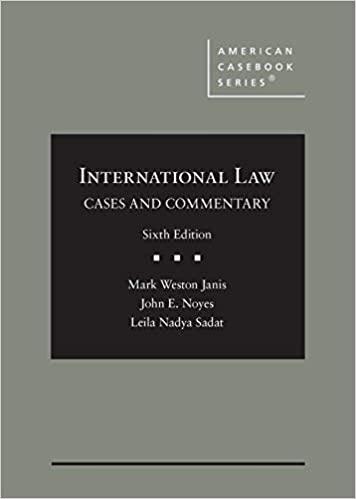Question
Case Study: The Bernina Distributors v. Bernina Sewing Machines case illustrates how a party did not anticipate the risk of a currency rate fluctuation. In
Case Study:
The Bernina Distributors v. Bernina Sewing Machines case illustrates how a party did not anticipate the risk of a currency rate fluctuation. In this case, a poorly written open price term resulted in significant monetary losses due to an unanticipated currency fluctuation. Bernina Distributors, Inc. v. Bernina Sewing Mach.
646 F.2d 434 (10th Cir. 1981) Defendant Bernina Sewing Machine Co. (Importer), a Utah corporation, imports and supplies Bernina sewing machines to plaintiff Bernina Distributors (Distributor). The problem arises from the fluctuations of exchange rates and decreases in the value of the U.S. dollar versus the Swiss franc. The case involves a long-term supply contract for seven years. The contract contained an open price term in which "prices are automatically subject to change when factory costs are increased." The importer is required to pay in Swiss francs. The open price term allowed Importer to increase prices as follows: "(a) To the extent of increase of factory invoice costs to Importer. (b) any increase in duty charges. (c) increases in insurance, freight, handling, broker and port fees, or similar charges. Increases in factory invoice costs shall be adjusted as they occur. Increases to all other charges shall be adjusted at the commencement of each calendar year." But with the precipitous decline of the dollar in relation to the Swiss franc, Importer's costs nearly doubled. Judge: Importer maintains that the risk of currency fluctuations had not been allocated in the contract and that, under the Uniform Commercial Code, an "open price term" should be what the court finds to be reasonable. We (court) believe that the contract provisions are quite comprehensive and, hence, the statutory provision is inapplicable to this case. Thus, we believe the contract places the risk of a diminishing profit margin on Importer and that Importer bears the risk of currency fluctuations. Importer also asserts that the court's interpretation makes the contract impracticable under 2-615 of the Uniform Commercial Code. The UCC excuses performance under a contract when performance "has been made impracticable [hardship] by the occurrence of a contingency the nonoccurrence of which was a basic assumption on which the contract was made." In our view, the instant contract is not one made impracticable by the contingency of the devalued dollar. Comment 8 to 2-615 states that this excuse does "not apply when the contingency in question is sufficiently foreshadowed at the time of contracting." Also, cost increases alone do not render a contract impracticable. Importer was aware of the possibility of a reduction in profits due to exchange rate fluctuations and could have guarded against this contingency. For example, a cost-plus formula for determining the price could have been utilized. To grant relief on this issue would be to disturb an agreed-upon allocation of risk between commercial equals. Furthermore, the contract was not rendered impracticable due to the increase in costs to the Importer related to currency fluctuation. Case Highlights Common practice of entering into long-term supply contracts Use of open price or price escalation clauses to adjust the contract price over the term of the contract A determination that a risk has been allocated to one of the parties defeats a demand for a contract adjustment Contract law allows for an excuse from not fulfilling a contract. In the sale of goods, the Uniform Commercial Code 2-615 grants an excuse for commercial impracticability. The law also allows the parties to write an express excuse or force majeure clause An excuse for commercial impracticability will not be granted if the risk was foreseeable or where the burden on a party is not unduly severe Since currency fluctuations are foreseeable, courts are likely to view them as allocated risks and are unlikely to grant an excuse It is important to write clear and detailed clauses, especially in long-term contracts. The Court suggested the use of a "cost-plus" formula in the open price term.
Read the following scholarly article about the decision in the case: https://scholarship.law.unc.edu/cgi/viewcontent.cgi?referer=https://www.google.com/&httpsredir=1&article=1202&context=ncilj
This not a formal IRAC - style case briefing, you should discuss the following:
What is the outcome of the case? What is the UCC and its Doctrine of Commercial Impracticability? Focus on the latter's criteria for unforeseeability and hardship.
What are some ways a foreign importer or exporter can minimize foreign exchange fluctuation risks? Do you think the decision in this case was the right one? Why or why not?
1 page minimum.
The full case is referenced at this link:
https://law.resource.org/pub/us/case/reporter/F2/646/646.F2d.434.78-1934.html
Step by Step Solution
There are 3 Steps involved in it
Step: 1

Get Instant Access to Expert-Tailored Solutions
See step-by-step solutions with expert insights and AI powered tools for academic success
Step: 2

Step: 3

Ace Your Homework with AI
Get the answers you need in no time with our AI-driven, step-by-step assistance
Get Started


